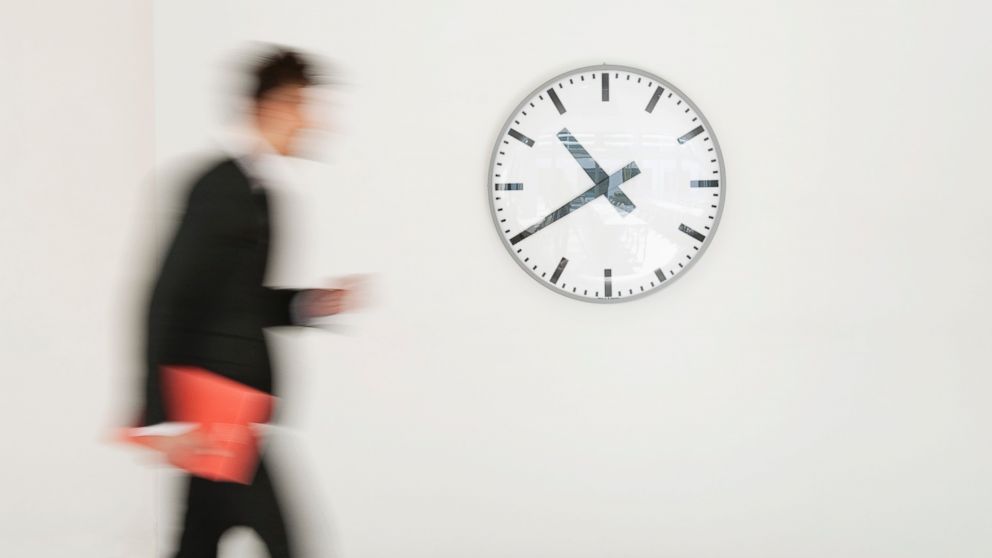Ways to Make the Switch to Daylight Saving Time Less Miserable
You've made it through the endless winter of 2014-15. Almost.

— -- intro:You've made it through the endless winter of 2014-15 (almost), and spring is around the corner. The first signpost of the new season arrives in the wee hours of Sunday, March 8, when most of us turn our clocks ahead one hour to inaugurate Daylight Savings Time.
But "springing forward," as fun as it sounds, isn"t all it’s cracked up to be, according to sleep specialist and clinical psychologist Michael Breus, PhD. “Most people actually have a harder time adjusting when we ‘spring forward,’ because we’re losing an hour of sleep,” Breus says. And those of us who are already chronically sleep deprived can’t afford to lose any more. In fact, a survey released this week from the National Sleep Foundation found that, on average, Americans report a sleep debt of about 26 minutes on workdays (that’s the gap between how much shut-eye people say they need and how much they actually get).
But, thankfully, there are steps you can take to make the time change more bearable.
14 Reasons You're Always Tired
quicklist: 1category: Ways to Make the Switch to Daylight Savings Time Less Miserabletitle: Start by dialing back your bedtimeurl:text:"If you’re among the many Americans who are sleep deprived, it probably won’t be difficult for you to fall asleep at the new time," Breus says. Just be sure to set your clock ahead before going to sleep on Saturday, March 7. "That way, seeing the lost hour up front will motivate you to go to bed earlier." Waiting to change your clocks the next morning and watching that hour disappear can feel like a loss, says Breus.
If you’re among the only marginally sleep deprived, or if you have generally good sleep habits, you can get yourself in gear by pulling back your bedtime incrementally before the time change. “On the Wednesday before the time change, go to bed 15 minutes earlier," Breus suggests. "On Thursday, go to bed another 15 minutes earlier, and another 15 the next two nights so that by Saturday, you’re going to bed an hour early."
The time change disruption is worse for kids, for whom regular bed times and consistent habits are especially important. "If they get to stay up until 11pm on Friday night, make it 10pm," says Breus. "Since they’re losing the hour, they need to go to bed earlier." It’ll pay off come school day.
How to Sleep With Someone Who Snores
quicklist: 2category: Ways to Make the Switch to Daylight Savings Time Less Miserabletitle: Avoid certain drinks this weekendurl:text:You already know that limiting your alcohol intake is generally a smart move, and this weekend in particular, Breus advises capping your nightcap. "Even though alcohol makes you feel sleepy, it prevents you from reaching those all-important deeper stages of sleep. So if you're already going to be losing an hour of sleep, the last thing you need is poorer quality sleep." Abstaining may make for less fun on the weekend, but will help you get back in the swing on Monday.
Breus also suggests going easy on the caffeine. If you feel like that cuppa Joe is necessary to jump-start your acclimation, just be sure to stop sipping by 2pm so as not to interfere with your new, earlier bedtime.
The Best and Worst Foods for Sleep
quicklist: 3category: Ways to Make the Switch to Daylight Savings Time Less Miserabletitle: Play it safe on Monday morningurl:text:Not all of us have the most flexible work schedules, but Breus advises seeking leniency this one day out of the year. "Ask your boss if you can come in to work a little late the Monday after the time change, or ask if you can work from home." For one, this allows you to reap the health benefits of catching up on those all-important lost zzz’s. And if you drive to work, it also allows you to stay off the roads on a particularly hectic and potentially dangerous morning. Research has shown an increase in fatal car accidents on the Monday following the spring time change compared to other Mondays before and after the start of Daylight Savings Time. "It’s not a bad idea to avoid rush hour on Monday morning when roads will be filled with sleep-deprived people running late for work or school," Breus says.
17 Ways Your Job Is Making You Fat
quicklist: 4category: Ways to Make the Switch to Daylight Savings Time Less Miserabletitle: Tweak your workout schedule (maybe)url:text:For some folks with a regular fitness routine, switching things up can help you adjust to Daylight Savings Time. "If exercise chills you out and relaxes you, the extra hour of evening light gives you more opportunity to exercise outdoors," Breus says. And regular exercise is a key component to maintaining a healthy sleep schedule. Just remember to preserve a three-hour window between your sweat session and bedtime so you have enough time to wind down, he suggests.
"On the other hand, if you feel energized after your workouts, you should keep doing it in the morning, time change or not, because you don’t want that energy boost to lead to insomnia,” Breus says. You'll just be up in the dark—again.




